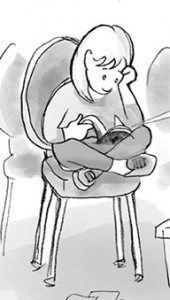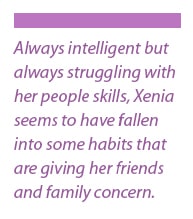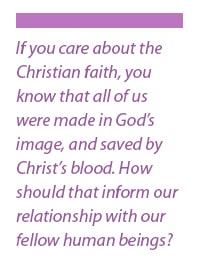 Welcome to my latest read-along. For the next six weeks, I’ll be posting thoughts and reflections as we read through this latest book in the Every Tuesday Club series. It’s a handy way for me to try to unpack a little of what I had in mind, and hopefully it’ll offer a little Lenten reflection as well. Let’s begin at the beginning.
Welcome to my latest read-along. For the next six weeks, I’ll be posting thoughts and reflections as we read through this latest book in the Every Tuesday Club series. It’s a handy way for me to try to unpack a little of what I had in mind, and hopefully it’ll offer a little Lenten reflection as well. Let’s begin at the beginning.
Where are we now?
So, where do we find our favorite tech girl, at the beginning of Xenia the Warm-hearted? Well, not to put too fine a point on it, but judging from the introduction, she’s not doing at all well. She’s huddled miserably in the shelter of some old building on a rainy afternoon in June — wet and shivering and apparently scared of her wits? Why? What’s going on that has her so terrified?
 Well, we’ll get to that in time — a few hundred pages, to be more accurate. But first, we are going to start the story back at the beginning. Chapter one opens three weeks earlier, in circumstances much more ordinary and alarming. Xenia is hanging out with her shy friend Photini and having much more of the kind of summer afternoon one would expect a fourteen-year-old to have. Being Xenia, she is multitasking — playing a computer game on multiple screens while attempting to keep up with Photini’s typical blend of gabbing and fussing.
Well, we’ll get to that in time — a few hundred pages, to be more accurate. But first, we are going to start the story back at the beginning. Chapter one opens three weeks earlier, in circumstances much more ordinary and alarming. Xenia is hanging out with her shy friend Photini and having much more of the kind of summer afternoon one would expect a fourteen-year-old to have. Being Xenia, she is multitasking — playing a computer game on multiple screens while attempting to keep up with Photini’s typical blend of gabbing and fussing.
That’s more or less where we left the girls at the end of book three in the series — A Year of Every Tuesday. But it’s been a year since then, and there have been some changes. Besides little news of the day about Photini’s mother getting flowers and Xenia’s mother and brothers being away on vacation, there seem to be some developments that are beginning to add up. Xenia has been hearing from teachers that her social skills and her manners could use some attention, and Photini seems to have some thoughts about that as well. So, is there a problem? We’ll find out more in future chapters, but here in chapter one, things begin to coalesce around a confession that Xenia makes — she procrastinated on a relatively simple task, and now, she may not be able to go on a trip that all the girls had been looking forward to.
Besides that, there are some hints that Xenia’s situation at this point in her life is a bit complicated. Always intelligent but always struggling with her people skills, Xenia seems to have fallen into some habits and modes of thought that are giving her friends and family concern.
Just as the game that Xenia is playing isn’t quite innocent, her behavior is drifting into some troubling territory. So perhaps in the end, it’s no wonder that one simple mistake — “What if I hadn’t pushed the Print button?” — is the catalyst that starts the ball rolling. At the very least, it brings her father into the picture, and in the next couple chapters, we’ll find out a little of what he has to say about this misguided lexicon of Xenia’s that came off his office printer.
But meanwhile, a bit of perspective about what’s going on.
Xenia’s problem
When I begin any of these books in the series, there are a couple of questions I’m looking to answer. In spite of how different the five girls are from each other, the questions are basically the same:
- What would it take to wake this person up to the reality of Jesus Christ, alive and present in every moment?
- What do I wish someone had told me when I was her age?
Those both led me to the difficult area of socialization — the relationships you begin to build as you mature from childhood to adolescence and adulthood. And your ability to be alive to the humanity of others. In some ways, that is a challenge for all of us, at all times of our lives. Or at least, it is for me.
 I have always loved writing Xenia. If the ETC girls weren’t all my favorite, she would be my favorite. That stems in part from the catharsis of writing about someone who is such a total geek (though in my days, we were called nerds). Like her, I felt socially awkward as a teen. woefully unprepared for the daunting job of dealing with other people. Apart from the close bonds I had with my family, I found social interactions generally unsatisfactory and bewildering.
I have always loved writing Xenia. If the ETC girls weren’t all my favorite, she would be my favorite. That stems in part from the catharsis of writing about someone who is such a total geek (though in my days, we were called nerds). Like her, I felt socially awkward as a teen. woefully unprepared for the daunting job of dealing with other people. Apart from the close bonds I had with my family, I found social interactions generally unsatisfactory and bewildering.
And so, adult-me wishes she could go back and give fourteen-year-old-me some encouragement. But also, perhaps, a gentle boot in the rear. If you care about the Christian faith — and I did even then, many years before a serious commitment to the Church — then you know that all of us are made in God’s image. You also know that God came in the flesh for our sake, and that He lived and died for our salvation. You know that He is risen, and that we live in the incredible tension of the Church Age — somewhere on the continuum between Christ’s First and Second Advent.
Isn’t there enough there to inform your relationships with your fellow human beings? Even if you can’t be more of an evangelist in such a jaded, secular society, can’t you always be salt and light to others? And — to put it in less lofty and more practical terms — can’t you always be a better friend? A better son or daughter? Better student? Better Christian sister or brother?
I think I could’ve. I could’ve cared more, and when I look back at my thoughtlessness and apathy, I have real regrets. So I had the chance to think through the problem with Xenia and give her the education — and the boot in the rear — that I wish someone had given me. In a way, it sounded like an easy thing to do. But it wasn’t. Trying to answer question #2 brought me back to the more difficult question #1. If you begin asking yourself what you should do for others in order to be more Christ-like, it brings an awareness that God isn’t a disinterested party or an abstract concept. He is real and alive — all-powerful and all-loving. And He cares very much about the things you do. Realizing that can be the beginning of the real journey of faith.
For now, though, Xenia’s way forward comes about for a much more ordinary reason — she pushed the wrong button. So let’s see where that leads.
Coming up:
Wednesday: Sidebar — About gaming culture
Friday: Chapter two and three: Catching up with the ETC, and a deal with Fr. Andrew